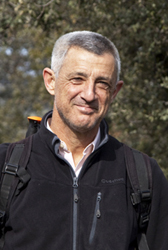The 17th EGC is pleased to welcome three keynote speakers.
Alfonso San Miguel
Department of Natural Systems and Resources, Polytechnic University of Madrid
(Madrid, Spain)
Title: Diversity, management and conservation of natural and semi-natural grasslands in Spain
Alfonso San Miguel is full professor at the Department of Natural Systems and Resources, Polytechnic University of Madrid. He is a member of the Spanish Society of Pastures (President between 2010-2014) and the Spanish Society of Geobotany. He is also the Director of the National Parks Chair. His research topic is management and conservation of natural and semi-natural grasslands and rangelands and their associated biodiversity: flora and fauna. Some of his latest works deal with typology of natural and semi-natural grasslands in Spain, Types of Habitats of Community Interest and wild ungulate carrying capacity and management in Natural Protected Areas.
Spain is a country with an amazing diversity of natural and semi-natural grasslands. Most of them are included in old cultural landscapes and/or High nature value (HNV) farmland. That is why their conservation, and that of their associated biodiversity (flora, fauna, habitats of Community interest), requires suitable management. In his keynote lecture, Professor San Miguel will present an overview of the diversity of natural and semi-natural grasslands in Spain and their associated biodiversity, and also address their conservation status after changes in management during the last decades.
ResearchGate profile:

Monika Janišová
Institute of Botany, Slovak Academy of Sciences
(Banská Bystrica, Slovakia)
Title: Species-rich semi-natural grasslands of Europe – historical masterpieces of human-nature interaction
Monika Janišová is a vegetation ecologist focusing mainly on grasslands, their classification, biodiversity, succession, management and conservation. She is also interested in biogeography and endemism, as well as population biology and conservation of rare plants. Recently, the main subject of her research includes traditional ecological knowledge, bio-cultural heritage and sustainable agriculture in the Carpathian Mountains (Central and Eastern Europe).
Examples of positive impact of humans on ecosystem biodiversity are rare. One of the phenomenal examples are species-rich secondary grasslands of Europe, which were formed as a consequence of low-intensity farming. Their maintenance is a main goal of current grassland conservation. Through several examples from the Carpathian Mountains, Dr. Janišová will try to demonstrate: i) the importance of a deep knowledge of local history and traditions, which lead to the formation of each particular grassland; ii) the risks associated with substitution of traditional grassland management practices by their modern analogies; iii) the irreplaceable role of domestic animals in grassland conservation. Additionally, she will highlight approaches inspired by our ancestors (based on traditional ecological knowledge) that could help to maintain or increase grassland diversity for our descendants.
ResearchGate profile:
https://www.researchgate.net/profile/Monika_Janisova3.

Arkadiusz Nowak
Institute of Biology, Opole University
(Opole, Poland)
Title: Diversity and conservation of grasslands and other open vegetation types in Tajikistan
Arkadiusz Nowak is a full professor at the Institute of Biology in the Opole University. At the same time, he serves as Director of the Polish Academy of Sciences Botanical Garden - Center of Biodiversity Conservation in Powsin. He is a member of the Polish Botanical Society and a State Council of Nature Conservation by the Minister of Climate and Environment. His main research topic is classification, typology and conservation of Middle Asian vegetation, particularly within the territory of Tajikistan, Kyrgyzstan and Uzbekistan. He is also examining the taxonomic diversity within the Stipa, Puccinellia and Campanula genera in the mountains of Pamir-Alai and western Tian Shan. Additionally, he is researching belowground diversity of Central European grasslands. As the Nature Conservator of the Regional Administration he established two landscape parks and 17 nature reserves in Opole voivodeship.
Tajikistan as the main part of the Mountains of Central Asia biodiversity hotspot is extraordinary rich in landscape diversity and thus a “paradise” for vegetation scientists. It is still underinvestigated in terms of vegetation classification and mapping. However, the research team of polish botanists has launched the project of vegetation classification in this area in 2006 focusing on vegetation survey, functional diversity of plant communities and conservation assessments of its rich flora. In his keynote lecture, Professor Arkadiusz Nowak will present an overview of the diversity of open habitats occurring in Tajikistan (steppes, pseudosteppes, semi-deserts, mires, salt-marshes, alpine meadows and pastures) with some remarks to their conservation status and perspectives.
ResearchGate profile:
